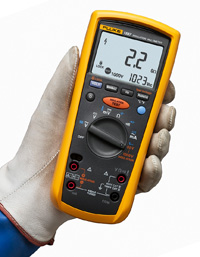August 2014 Newsletter – Insulation Resistance Testing
As included in most predictive maintenance programs, Insulation Resistance Testing is a essential metric in assessing the health of the conductors and motors driving HVAC & Chiller systems. This simple test may save the owner thousands of dollars in untimely repair costs if the test is safely measured, results regularly recorded and trending properly interpreted. The test should only be performed on a de-energized and tagged-out system by qualified and experienced personnel for both safety and accuracy purposes.
Commonly referred to as a “megger”, an insulation tester is used to apply voltage to conductors and motor windings to effectively measure electrical current leakage through and along its insulation. One misconception is that insulation testers measure the resistance of the insulator. While the tester may display a resistance reading in ohms, megohms, gigaohms, teraohms, etc. the tester itself measures electrical current leakage and displays the resistance calculation based on the voltage applied and Ohm’s Law. Most hand held testers apply direct voltage in the form of DC or direct current. The applied voltage magnitude depends on the motor rating, condition and the manufacturer’s recommendation. An incorrectly applied voltage can cause insulation failure so it’s important to understand which test should be applied to which type of equipment. For instance, some hermetic chiller motor insulation should only be subjected to a specific voltage magnitude. Step voltage testing over the motor rating could damage its insulation.
Some manufacturers will provide a detail as to how the test is to be performed while others manufacturing equipment 750 watts or greater refer to the latest publication of the IEEE 43 Recommended Practice for Testing Insulation Resistance of Electrical Machinery . This publication also recommends a standard by which the data correctly measured and corrected for temperature, duration, etc. can be best interpreted. A badly performed and/or interpreted test could lead to unnecessary replacement or unexpected failure in the peak season. Most HVAC & Chiller systems are driven by electric motors and their reliability is required to keep them running. Accurate motor insulation resistance testing is essential for plant managers and facility engineers to make decisions about expensive HVAC & Chiller system repair/replacement as well as ensuring the reliable operation of critical equipment.
Image property of Fluke

